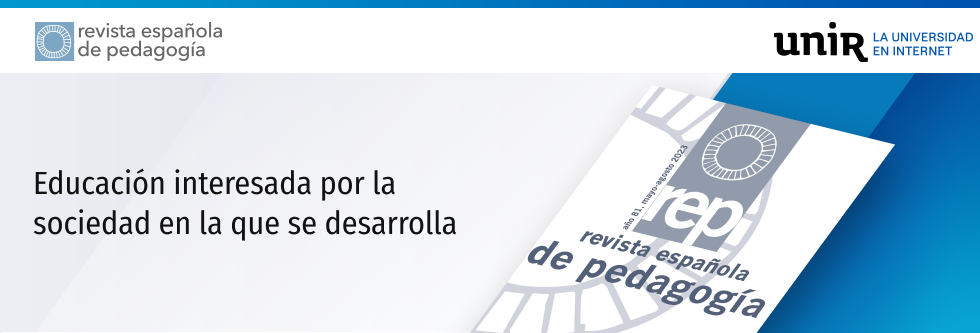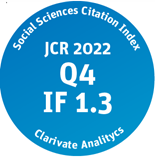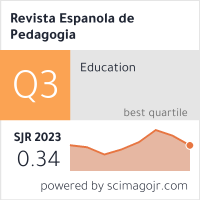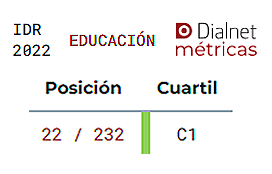DOI
10.22550/REP79-3-2021-04
Abstract
Research shows a high comorbidity between attention deficit hyperactivity disorder (ADHD) and language problems, similar to those seen in subjects with specific language impairment (SLI) (Helland et al., 2014; Korrel et al., 2017).
Our goal was to assess the differences in semantic and pragmatic linguistic competences between students with ADHD versus SLI and children with typical development. A total of 142 students, ages 7-12 (M=9.27; SD=1.41), from public, subsidised and private schools participated in the study: 48 (33.80%) with ADHD, 47 (33.09%) with SLI, and 47 (33.09%) with normal development. Linguistic competences were evaluated using the Objective and Criterion-referenced Language Suite (Batería de Lenguaje Objetiva y Criterial, or BLOC, Puyuelo et al., 1997).
We found significant differences in semantic (F (2.148)=86.99, p<.001) and pragmatic language skills (F (2.428)=83.00, p<.001) between the three study groups: ADHD, SLI and typical development.
Students with ADHD present fewer deficits in aspects of semantic language than those with SLI. However, they face greater obstacles in certain uses of pragmatic language compared with the children with SLI and typically developed students. They face significant difficulties in the use of pragmatic language in different communication situations and social interaction, and in different functions and uses.
Please, cite this article as follows: Paredes- Cartes, P. G., & Moreno-García, I. (2021). Competencias lingüísticas en el contexto escolar. Comparación entre alumnado con trastorno por déficit de atención con hiperactividad, trastorno específico del lenguaje y desarrollo normotípico | Linguistic competences at schools. Comparison of students with attention deficit hyperactivity disorder, specific language impairment and typical development. Revista Española de Pedagogía, 79 (280), 497-513. 10.22550/REP79-3-2021-04
Referencias | References
Acosta, R., Ramírez-Santana, G., & Hernández, E. (2016). Las funciones ejecutivas y el lenguaje en niños con diferentes subtipos de trastorno específico del lenguaje [Executive functions and language in children with different subtypes of specific language disorder]. Neurología, 16, 213-4853. 10.1016/j. nrl.2015.12.018
Acosta, V., Axpe, A., & Moreno, A. (2014). Rendimiento lingüístico y procesos lectores en alumnado con Trastorno Específico del Lenguaje [Linguistic performance and reading processes in pupils with Specific Language Impairment]. revista española de pedagogía, 72 (259), 477-490.
American Psychiatric Association (2013). Manual diagnóstico y estadístico de los trastornos mentales (DSM-5) [Diagnostic and Statistical Manual of Mental Disorders (DSM-5)]. Editorial Médica Panamericana.
Andreu, L., Sanz-Torrent, M., Guàrdia-Olmos, J., & MacWhinney, B. (2011). Narrative comprehension and production in children with SLI: an eye movement study. Clinical Linguistics and Phonetics, 25 (9), 767-783. https://doi.org /10.3109/02699206.2011.565542
Barkley, R. A. (2011). Niños hiperactivos. Cómo comprender y entender sus necesidades especiales. Guía completa del trastorno por déficit de atención con hiperactividad TDAH [Hyperactive children. Understanding and understand-ing their special needs. A complete guide to attention deficit hyperactivity disorder ADHD]. Paidos.
Bellani, M., Moretti, A., Perlini, C., & Brambilla, P. (2011). Language disturbances in ADHD. Epidemiology and Psychiatric Sci-ences, 20 (4), 311-315. 10.1017/ S2045796011000527
Brown, T. E. (2010). Comorbilidades del TDAH. Manual de las complicaciones del trastorno con déficit de atención con hiperactividad en niños y adultos. Editorial Elsevier Masson.
Buiza, J., Rodríguez-Parra, M., & Adrián, J. (2015). Trastorno Específico del Lenguaje: marcadores psicolingüísticos en semántica y pragmática en niños españoles [Specific Language Impairment: Markers into semantic and pragmatic areas in Spanish-speaking children]. Anales de Psicología, 3 (1), 879-889. https://doi. org/10.6018/analesps.31.3.180091
Coady, A. (2013). Rapid naming by children with and without specific language impairment. Journal of Speech, Language, Hearing Research, 56, 604-617. 10.1044/1092- 4388(2012/10-0144)
Conti-Ramsden, G., Bishop, M., Clark, B., Norbury, F., & Snowling, J. (2013). Toma de conciencia sobre los trastornos específicos del lenguaje: la campaña RALLI en Internet [Raising awareness of specific language impairment: The RALLI Internet campaign]. Revista de Logopedia, Foniatría y Audiología, 33 (2), 51-54. https:// doi.org/10.1016/j.rlfa.2013.04.004
Crespo-Eguílaz, N., Magallón, S., Sánchez-Carpintero, R., & Narbona, J. (2016). La adaptación al castellano de la Children’s Communication Checklist permite detectar las dificultades en el uso pragmático del lenguaje y diferenciar subtipos clínicos [The Spanish adapted version of the Children’s Communication Checklist identifies disorders of pragmatic use of language and differentiates between clinical subtypes]. Revista Neurología, 1, 49-57. https:// doi.org/10.33588/rn.62S01.2015526
Dunn, L. M., & Dunn, L. M. (2006). Test de vocabulario en imágenes [Peabody Picture Vocabulary Test, PPVT-III]. Editorial TEA Ediciones.
Ercan, E., Unsel-BolaT, G., Tufab, A., Demirkaya, S., Bilac, O., Celik, G., Kilic, B., Ardic, U., Sapmaz, S., Aksu, H., Tahiroglu, A., Karacetin, G., Turak, U., Aktepe, E., Arman, A., Basgul, S., Coskum, M., Dursun, O., Durukan, I., Fis, N., … Gormez, V. (2021). Effect of Impairment on the Prevalence and Comorbidities of Attention Deficit Hyperactivity Disorder in a national survey: Nation-wide prevalence and comorbidities of ADHD. Journal of Attention Disorders. 10.1177/10870547211017985
Evans, J. L., & Coady, J. A. (2010). Explaining Lex-ical-semantic deficits in specific language impairment: The role of phonological similarity, phonological working memory, and lexical competition. Journal of Speech, Language, and Hearing Research, 53 (6), 1742-1756. https:// doi.org/10.1044/1092-4388(2010/08-0198)
Faraone, V. E., Banaschewski, T., Coghill, D., Zheng, Y., Biederman, J., Bellgrove, M., J, Newcorn., M, Gignac., M., Saud, N, N., Manor, I., Rohde, A., Yang, L., Cortese, S., Almagor, D., Stein, M., Albatti, T., Aljoudi, H., Alqahtani., M., Asherson, P., Atwoli, L., … Bolte, S. ( 2021). The World Federation of ADHD international consensus statement: 208 evidence-based conclusions about the disorder. Neuroscience Biobehavioral Reviews, 2 (4). https://doi.org/10.1016/j.neubiorev.2021.01.022
Flory, K., Milich, R., Lorch, E. P., Hayden, A. N., Strange, C., & Welsh, R. (2006). Online story comprehension among children with ADHD: Which core deficits are involved? Journal of Abnormal Child Psychology, 34, 853-865. https://doi.org/10.1007/s10802-006-9070-7
Gallardo-Paúls, B., Gimeno-Martínez, M., & Moreno-Campos, V. (2010). Pragmática textual en adolescentes con trastorno por déficit de atención/ hiperactividad: argumentación [Textual pragmatics in adolescents with Attention Deficit/Hyperactivity Disorder: Argumentation]. Revista Neurología, 50, 113-7.
González-Castro, P., Rodríguez, C., Cueli, M., Cabeza, L., & Álvarez, L. (2013). Competencias matemáticas y control ejecutivo en estudiantes con trastorno por déficit de atención con hiperactividad y dificultades de aprendizaje de las matemáticas [Mathematical competence and executive control in students with Attention Deficit Hyperactivity Disorder and mathemat-ical learning disabilities]. Revista de Psicodidáctica, 19 (1), 125-143.
Helland, W. A., Helland, T., & Heimann, M. (2014). Language profiles and mental health problems in children with specific language impairment and children with ADHD. Journal of Attention Disorders, 15 (3), 26-35. https://doi. org/10.1177/1087054712441705
Helland, W. A., Posserud, M. B., Helland, T., Heimann, M., & Lundervold, A. J. (2016). Language impairments in children with ADHD and in children with reading disorder. Journal of Attention Disorders, 20 (7), 581-9. https://doi. org/10.1177/1087054712461530
Hutchinson, E., Bavin, E., Efron, D., & Sciberras, E. (2012). A comparison of working memory profiles in school-aged children with Spe-cific language impairment, attention deficit/hyperactivity disorder, comorbid SLI and ADHD and their typically developing peers. Child Neuropsychol, 18 (2), 190-207. https:// doi.org/10.1080/09297049.2011.601288
Idiazábal, M., Guerrero, D., & Sánchez, M. (2006). Procesamiento del lenguaje en el trastorno por déficit de atención con hiperactividad [Language processing in attention deficit hyperactivity disorder]. Revista de Neurología, 42 (2), 29-36. 10.33588/rn.42S02.2005783
Kaufman, A., & Kaufman, N. (2009). Test breve de inteligencia K-BIT [K-BIT brief intelligence test]. Editorial TEA Ediciones.
Korrel, H., Mueller, K. L., Seda, T., Anderson, V., & Sciberras, E. (2017). Research review: Language problems in children with attention-deficit hyperactivity disorder – a systematic meta-analytic review. The Journal of Child Psychology and Psychiatry, 10. https://doi. org/10.1111/jcpp.12688
Lambalgen, M., Kruistum, C., & Parigger, E. (2008). Procesamiento del discurso en el trastorno de déficit de atención e hiperactividad TDAH [Discourse processing in attention-deficit hyperactivity disorder (ADHD)]. Diario de la Lógica, Lenguaje e Información, 17 (4), 467-487. https:// doi.org/10.1007/s10849-008-9066-5
McGrath, L., Pennington, B., Shanahan, M., Santerre-Lemmon, L., Barnard, H., Willcutt E., Defries, J., & Olson, R. (2011). A multiple deficit model of reading disability and attention deficit/hyperactivity disorder: the search for shared cognitive deficits. The Journal of Child Psychology and Psychiatry, 52 (5), 547-57. https://doi.org/10.1111/j.1469-7610.2010.02346.x
McGregor, K., Rost, C., Guo, L., & Sheng, L. (2010). What compounds mean to children with SLI. Applied Psycholinguistics, 31 (3), 463-487. https://doi.org/10.1017/S014271641000007X
Mendoza, E. (2016). Trastorno específico del lenguaje (TEL). Avances en el estudio de un trastorno invisible [Specific language impairment (SLI). Advances in the study of an invisible disorder]. Ediciones Pirámide.
Moraleda, E., Fernández, L., Sánchez, J., & López P. (2018). Perfil lingüístico en niños y adolescentes con trastorno por déficit de atención e hiperactividad-TDAH [Linguistic profile in children and adolescents with attention deficit hyperactivity disorder]. International Journal Developmental Educational Psycholy, 2, 151-158
Mueller, L., & Tomblin, B. (2012). Examining the comorbidity of language disorders and ADHD. Topics in Language Disorders, 32 (3), 228-46.
Noger, S., & Artiga, J. (2009). Trastorno de déficit de atención hiperactividad [Attention deficit hyperactivity disorder (ADHD)]. In J. Artigas (Ed.), El niño incomprendido (pp. 35-55). Amat, S.L.
Peetsa, K., & Tannock, R. (2011). Los errores y autocorrecciones en la narración distinguen el TDAH del TDAH con trastornos del lenguaje [Errors and self-correction in narrative distinguish ADHD from ADHD with language impairments]. Revista de Logopedia, Foniatría y Audiología, 31 (4), 228-236. https://doi. org/10.1016/S0214-4603(11)70191-7
Puyuelo, M., Wiig, E. H., Renom, J., & Solanas, A. (1997). Batería del lenguaje objetiva y criterial [Objective and criterial language battery]. Editorial Masson.
Ramírez-Santana, G. M., Acosta-Rodríguez, V. M., Moreno-Santana, A. M., del Valle-Hernández, N., & Axpe-Caballero, Á. (2017). El uso combinado de narraciones orales y actividades morfosintácticas para mejorar habilidades gramaticales de alumnado con trastorno específico del lenguaje (TEL) [Use of oral narrative and morphosyntactic activities to improve grammar skills in pupils with specific language impairment (SLI)]. Revista de Psicodidáctica, 23 (1), 48-55. 10.1016/j.psicod.2017.07.002
Rodríguez-Meirinhos, A., & Ciria-Barreiro, E. (2018). Revisión de intervenciones para mejorar las habilidades pragmáticas en niños y niñas con problemas de conducta y atención | Review of interventions to improve pragmatic language skills in children with behaviour and attention problems. revista española de pedagogía, 76 (270), 295-312. https://doi. org/10.22550/REP76-2-2018-05
Schreiber, J., Possin, K., Girard, J., & Rey-Casserly, C. (2014). Executive function in children with attention deficit hyperactivity: NIH EXAMINER battery. Journal of the International Society of Neuropsychology, 20 (1), 41-51. https:// doi.org/10.1017/S1355617713001100
Shaw, P., Malek, M., Watson, B., Sharp, W., Evans, A., & Greenstein, D. (2012). Development of cortical surface area and gyrification in attention-deficit/hyperactivity disorder. Biological Psychiatry, 72 (3), 191-197. https://doi. org/10.1016/j.biopsych.2012.01.031
Sowerby, P., Seal, S., & Tripp, G. (2011). Working memory deficits in ADHD: The contribution of age, learning/language difficulties, and task parameters. Journal of Attention Disorders, 15, 461-472. https://doi. org/10.1177/1087054710370674
Staikova, E., Gomes, H., Tartter, V., McCabe, A., & Halperin, J. M. (2013). Deficits pragmáticos y el deterioro social en los niños con TDAH [Pragmatic deficits and social impairment in children with ADHD]. Journal Child Psychol Psychiatry, 12, 1275-1283.
Szenkman, D., Fumagalli, J., & Martínez-Cuitiño, M. (2015). Adaptación de una herramienta para evaluar la morfosintaxis temprana. El Rice-Wexler test of early grammatical impairment TEGI [Adaptation of a tool for assessing early morphosyntax. The Rice-Wexler test of early grammatical impairment TEGI] [Poster presentation]. VII Congreso Internacional de Investigación y Práctica Profesional en Psicología XXII. Jornadas de Investigación Décimo Encuentro de Investigadores en Psicología del MERCOSUR. Facultad de Psicología, Universidad de Buenos Aires, Buenos Aires. http://dx. doi.org/10.13140/RG.2.1.4753.8802
Tomblin, J. B., & Mueller L. K. (2012). How can comorbidity with attention-deficit/hyperactivity disorder aid understanding of language and speech disorders? Topics in Language Disorders, 32 (3), 198-206. http://dx.doi.org/10.1097/ TLD.0b013e318261c264
Uekermann, J., Kraemer, M., Abdel-Hamid, M., Schimmelmann, B. G., Hebebrand, J., Daum, I., Wiltfang, J., & Kis, B. (2010). Social cognition in attention-deficit hyperactivity disorder (ADHD). Neuroscience and Biobehavioral Reviews, 34 (5), 734-743. 10.1016/j. neubiorev.2009.10.009
Vaughn, A., Epstein, J., Rausch, J., Altaye, J., Newcorn, J., Hinshaw, S., & Wigal, T. (2011). Relation between outcomes on a continuous performance test and ADHD symptoms over time. Journal of Abnormal Child Psychology, 39, 853-864. 10.1007/s10802- 011-9501-y
Ygual, A. (2011). Los trastornos del lenguaje en el trastorno por déficit de atención con hiperactividad (TDAH) [Language disorders in the attention deficit-hyperactivity disorder (ADHD)]. Revista de Logopedia, Foniatría y Audiología, 31 (4), 181-182. 10.1016/S0214- 4603(11)70186-3
Zegarra-Valdivia1, J., & Chino, B. (2017). Mental-ization and the theory of mind. Journal of Neuro-Psychiatry, 80 (3), 189-199. http://dx.doi. org/10.20453/rnp.v80i3.3156
Citación recomendada | Recommended citation
Paredes-Cartes, P. G. & Moreno-García, I. (2021). Competencias lingüísticas en el contexto escolar. Comparación entre alumnado con trastorno por déficit de atención con hiperactividad, trastorno específico del lenguaje y desarrollo normotípico | Linguistic competences at schools. Comparison of students with attention deficit hyperactivity disorder, specific language impairment and typical development. Revista Española de Pedagogía, 79 (280), 497-513. 10.22550/REP79-3-2021-04
Licencia Creative Commons | Creative Commons License
Esta obra está bajo una licencia internacional Creative Commons Atribución-NoComercial 4.0.
This work is licensed under a Creative Commons Attribution-NonCommercial 4.0 International License
Palabras clave | Keywords
ADHD, linguisticskills, pragmatics, semantics, SLI, student







